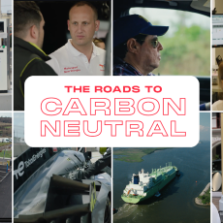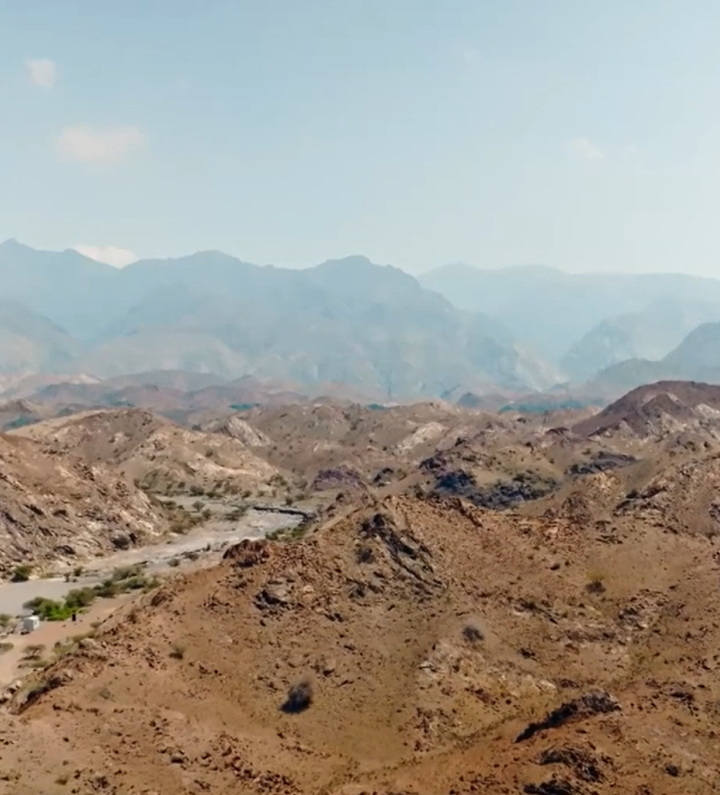The Roads to Carbon Neutral - Season 4 - Episode 4 - Harnessing Solar Energy to Provide Easier Access to Drinking Water: a Sustainable Revolution in Oman
The Roads to Carbon Neutral - Season 4 - Episode 4
Harnessing Solar Energy to Provide Easier Access to Drinking Water: a Sustainable Revolution in Oman
The Roads to Carbon Neutral
The fourth season of our program entitled "The Roads to Carbon Neutral", in partnership with CNBC Catalyst, provides an insight into the solutions and innovations making the transition to low-carbon energy a reality and helping us achieve a carbon-neutral future(1). These powerful on-the-ground stories are led by TotalEnergies' employees.
For this fourth episode, we are heading to the Sharqiyah desalination facility in Sur (Oman). This Veolia-operated industrial site is now benefiting from the region’s exceptional sunshine thanks to TotalEnergies’ photovoltaic systems. Georgio Akiki, Distributed Generation Country Manager, United Arab Emirates and Oman, explains how solar energy is enabling the Company to supply renewable electricity to improve access to drinking water in the Sultanate.
The power of the sun is truly incredible in Oman. Temperatures can reach upwards of 50°C. It dictates our daily lives in the country. Climbing is actually better done when it’s a bit cool and fresh. Depending on the location, we target the time of day when it’s completely in the shade. Despite all these mountains, Oman is still a dry country with very little precipitation. The demand for fresh water is much higher than what the country can naturally produce. The majority of the running water available in Oman comes from desalination, the process of taking seawater and removing the salt to produce fresh water. It’s an extremely energy-intensive process, and what TotalEnergies does is install solar power at these large plants to produce sustainable power for their processes. The TotalEnergies project in Sur is one of the proudest achievements of my career. Oman is in the southeastern part of the Arabian Peninsula. It’s mostly surrounded by water from the Arabian Sea and the Indian Ocean. But despite being surrounded by all this seawater, freshwater is scarce. Currently, 86% of Oman’s drinking water comes from desalination.
I grew up in Lebanon. I moved to Canada when I was 17. I started my career in the mining industry and, while it was good, I didn’t really feel fulfilled and I decided to do a career switch. I came full circle and moved back to the region, the Middle East, in 2015, and I’ve always had a very strong connection with Oman. If desalination plants didn’t exist, life here would be very different. We wouldn’t be able to sustain the population and the quality of life that we have. As the population increases, the demand will increase as well. By 2025, it is estimated that 1.8 billion people will face water scarcity. We expect desalination capacity to double by 2030. There is an intrinsic need to produce sustainable power. I’m very proud of the work we’ve done with Veolia for the Sharqiyah Desalination Plant. The project delivers clean water for more than 600,000 inhabitants of the region. The desalination process is a very intensive process, pumping water from the sea. After pumping this water, it goes through the filtration process, filtering it through membranes to remove the salt and unwanted particles. We are working with high pressure. To develop that much of a pressure, we need HP pumps, high pressure pumps. To run those pumps, we need a lot of energy.
With solar power, TotalEnergies collaborates with us to decarbonize this process. The technology we use is quite advanced: bifacial modules that have trackers which follow the sun as it rises and sets during the day. It consists of 32,000 panels. To give you an idea of the scale, this is the equivalent of 18 football pitches. That reduces the carbon footprint of Veolia by more than 300,000 tonnes of CO2. The Sur desalination plant currently processes enough water to fill eight Olympic swimming pools per day. I enjoy knowing there’s a higher purpose to my job. Being part of a project like this, I feel like I’m getting a glimpse of the future. And that is really powerful.
Most of the running water available in Oman comes from desalination, which is an extremely energy-intensive process. TotalEnergies is installing solar power plants in the immediate vicinity of these large desalination facilities to provide them with renewable electricity and reduce their carbon footprint. [...] I love knowing that my work has a higher purpose. By participating in a project like this, I feel like I'm getting a glimpse of the future, and that's really powerful.Georgio Akiki Distributed Generation Country Manager, United Arab Emirates and Oman
Developing our multi-energy activities in the Middle East
TotalEnergies, a global integrated multi-energy company, is helping a number of oil and gas-producing countries in the Middle East to move forward with their energy transition plans. The aim is to diversify the energy supply in these countries and give people easier access to a greener form of electricity.
We are leveraging our leading position in the region to develop large-scale projects, such as in Qatar, Iraq, Libya and Oman. These many partnerships bear testament to our long-term commitment to this region where our Company was created and reflect our ability to build a more sustainable future through the better use of natural resources.
The Roads to Carbon Neutral
(1) TotalEnergies is committed to a balanced multi-energy strategy. Anchored on two pillars - hydrocarbons, particularly LNG, on the one hand, and electricity, the energy at the heart of the transition, on the other - the company is building a strong position to support its customers' energy transition. To find out more about our strategy: https://totalenergies.com/energy-transition.
(2) Source: Food and Agriculture Organization of the United Nations (FAO): https://www.fao.org/land-water/water/water-scarcity/en/.























